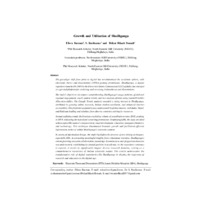Growth and Utilisation of Shodhganga
Metadata
Growth and Utilisation of Shodhganga
The paradigm shift from print to digital has revolutionised the academic sphere, with electronic theses and dissertations (ETDs) gaining prominence. Shodhganga, a digital repository launched in 2009 by the University Grants Commission (UGC) of India, has emerged as a pivotal platform for archiving and accessing Indian theses and dissertations. The study's objectives encompass comprehending Shodhganga's usage patterns, global and regional engagement, yearly update trends, and text analysis of titles using Latent Dirichlet Allocation (LDA). The Google Trends analysis revealed a rising interest in Shodhganga, attributed to growing online research, Indian student enrolment, and enhanced internet accessibility. The platform's popularity was underscored by global interest, with India, Nepal, and Pakistan leading and scholars from diverse countries seeking its resources. Annual updating trends disclosed an escalating volume of contributions since 2010, peaking in 2019, indicating the repository's evolving prominence. Employing LDA, the study unveiled salient topics like women's empowerment, rural development, education, inorganic chemistry, and technology. This technique illuminated thematic growth and facilitated efficient information retrieval within Shodhganga's extensive content. In an era of information deluge, the study highlights the prowess of text mining techniques, especially LDA, in extracting meaningful insights from voluminous text data. Shodhganga's role in fostering research collaboration, knowledge dissemination, and plagiarism detection was underscored, establishing its pivotal position in academia. As the repository continues to expand, it stands to significantly impact diverse research domains, serving as a comprehensive repository of Indian scholarly output. The article underscores the transformative role of digital repositories like Shodhganga in shaping the trajectory of research and education in the digital age.
2023

